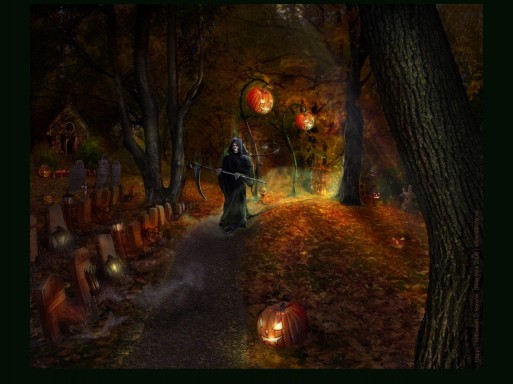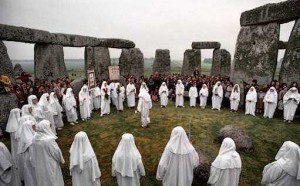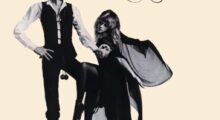
Representations of a threatening, monster-like death are the norm in Halloween imagery
It’s that time of year again. Jack O’Lanterns, false cobwebs, and paper or plastic skeletons are popping up all over the place. If you awakened from a coma, you could probably approximate the date. It’s time for Halloween, one of America’s most enthusiastically celebrated holidays. Time to buy costumes, decorations, candy, and alcohol by the carload. The only holiday to spur more consumer spending is Christmas. One of the oldest holidays in recorded history, Halloween has always been a little different from other days of celebration or leisure, the only day of the year where it’s okay to dress up like a vampire or zombie, and otherwise conduct oneself in ways that would otherwise be highly socially unacceptable. Amidst the wholesome trick-or-treaters and the raucous parties, it’s easy to forget that once upon a time, and still in many parts of the world, Halloween was not about scaring or buying or putting on a show. It was a semi-religious, respected, and even feared annual milestone, during which people would grapple with their fears of death and the supernatural.
Today’s Halloween is most likely originally rooted in ceremonies by Celtic Druids in Ireland on “Samhain,” a day commemorating the end of summer and the Celtic New Year. The Celts believed that the spirits of the dead returned on this day to play tricks on the living and damage their crops, and Celtic priests developed an elaborate set of rituals with which they could defend themselves, such as wearing masks to frighten away the spirits, and sparking towering bonfires complete with animal sacrifices (the word “bonfire” is believed to be a corruption of “bone-fire”). When the Romans reached the British Isles, their own late October holiday to honor the dead, “Feralia,” merged with that of the Druids. When the influence of the Christian church spread north, they brought with them the celebration of “All Saints Day” on November 1st, later renamed “All Hallows” — hence “All Hallows Eve,” of which the modern “Halloween” is an etymological corruption, on October 31st. In the mid-1800s, during and following the Irish Potato Famine, Irish and English immigrants crossed over to the United States in overwhelming numbers. They brought Halloween with them, and apparently it caught on.

Celtic Druids Celebrating Samhain
This once venerated holiday is now a far less serious affair, as consumerism seems to have largely taken over where spirituality once resided. Some, such as author David Skal, believe that this is partly because Americans are less worried about death. It just isn’t that much a part of our lives any more, at least not enough to necessitate elaborate superstitions and rituals with which to ward it off. This is not the case in Spain and Latin America, where Halloween’s equivalent, El Dia de los Muertos, is an opportunity to celebrate and remember the lives of those who passed during the preceding year.
While the spiritual side of American Halloween has been pretty thoroughly subsumed, it still shows its face here and there. Skal cites the example of the first Halloween after September 11th, 2001, the day when death came back to America with a vengeance. According to his interpretation, we showed a sudden appreciation for the memorial aspect of the holiday. Jack-o-lanterns were carved with reliefs of the World Trade Center. New York police and firefighters were some of the most common costumes nationwide. The Greenwich Village parade was far less raucous than it had been in the past. In this case, the day helped to allow us to cope with a trauma, one which so many others around the world and throughout history have experienced with far more regularity.
It is interesting that so many distinct peoples seem to share this cultural rite in common: some manifestation of a day reserved for the dead, most often found when the seasons shift and the reality of life changes. And even here in long-living, death-defying America, perhaps Halloween still serves such a purpose. Maybe it just takes a little more searching to find out what it is.

 Halloween’s Deathly History
Halloween’s Deathly History


 “Songbird” by Fleetwood Mac
“Songbird” by Fleetwood Mac

 How to Comfort A Dying Loved One
How to Comfort A Dying Loved One














